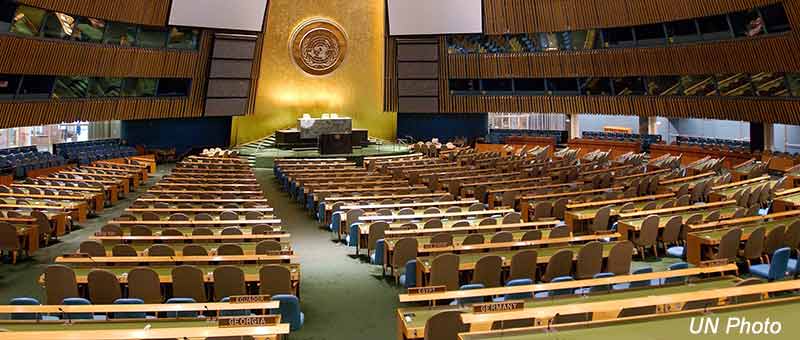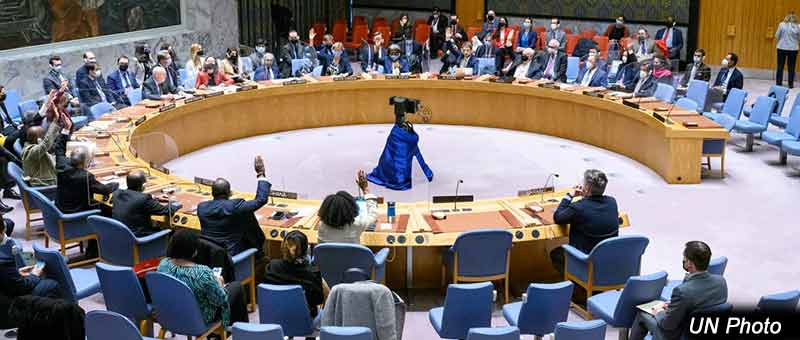- World
- Apr 27
Explainer - What is ‘Veto Initiative’ of the UN General Assembly?
The UN General Assembly held its first ever formal debate on the use of the veto in the Security Council, with speakers deliberating the impact of the new transparency and accountability mechanism, a year since the adoption of the resolution.
India has emphasised that the exercise of veto in the UN Security Council (UNSC) is driven by political considerations and not by moral obligations, saying that only five permanent members being given the privilege of using the veto goes against the very concept of sovereign equality of states.
UN Security Council
• The UN Security Council has primary responsibility for the maintenance of international peace and security.
• Under the Charter of the United Nations, all Member States are obligated to comply with Council decisions.
• The Security Council takes the lead in determining the existence of a threat to the peace or act of aggression.
• It calls upon the parties to a dispute to settle it by peaceful means and recommends methods of adjustment or terms of settlement.
• In some cases, the Security Council can resort to imposing sanctions or even authorise the use of force to maintain or restore international peace and security.
• The Council is composed of 15 members.
• Five permanent members are: China, France, Russian Federation, the United Kingdom, and the United States.
• Ten non-permanent members are elected for two-year terms by the General Assembly.
• The 10 non-permanent seats are distributed on a regional basis.
The right to veto
• The creators of the United Nations Charter conceived that five countries — China, France, the USSR (which was succeeded in 1990 by the Russian Federation), the United Kingdom and the United States — because of their key roles in the establishment of the United Nations, would continue to play important roles in the maintenance of international peace and security.
• They were granted the special status of Permanent Member States at the Security Council, along with a special voting power known as the “right to veto”.
• It was agreed by the drafters that if any one of the five permanent members cast a negative vote in the 15-member Security Council, the resolution or decision would not be approved.
• If a permanent member does not fully agree with a proposed resolution but does not wish to cast a veto, it may choose to abstain, thus allowing the resolution to be adopted if it obtains the required number of nine favourable votes.
• All five permanent members have exercised the right of veto at one time or another, with 44 vetoes since the year 2000.
• Russia used its veto to prevent the UNSC from taking action in response to their invasion in Ukraine.
What is Veto Initiative?
• On April 26, 2022, the General Assembly adopted a landmark resolution aimed at holding the five permanent Council members accountable for their use of veto.
• A resolution, titled “Standing mandate for a General Assembly debate when a veto is cast in the Security Council”, was tabled by Lichtenstein, and co-sponsored by 83 Member States, including three permanent Council members — France, United Kingdom and the United States.
• The resolution was tabled in the wake of Russia’s use of the veto in the Council, the day after it invaded Ukraine, calling for its unconditional withdrawal from the country.
• Following the resolution adopted by consensus without a vote, any such use will now trigger a General Assembly meeting, where all UN members can scrutinise and comment on the veto.
• The UNGA decided that its President shall convene a formal meeting of the 193‑member organ within 10 working days of the casting of a veto by one or more permanent members of the Council and hold a debate on the situation as to which the veto was cast, provided that the Assembly does not meet in an emergency special session on the same situation.
• The aim is to hold these five permanent members accountable for exercising this special voting power, which allows them to block any Council resolution or decision.
• The ‘Veto Initiative’ gave the Assembly’s wider membership a greater voice in Council matters when the Council is prevented from taking action by one of its permanent members.
Manorama Yearbook app is now available on Google Play Store and iOS App Store


